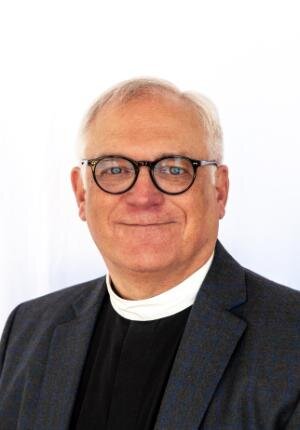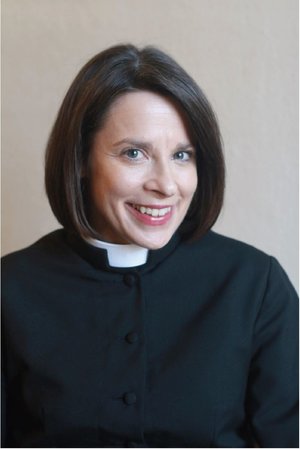A Sermon preached at Evensong and Benediction for the Society of Catholic Priests’ Conference
St Philip’s in the Hills
1 October 2019
Commemoration of Remigius
The Revd David Cobb (bio)
Hosea 4:1-10 and St Matthew 7:1-12
In my work with the field education program at Sewanee, I will often tell mentors and students that I am a far better priest than I might have been because of the seminarians and ordinands with whom I have worked. Within the society, we are better for working with each other; we are better for praying with and for each other; and we are better for having spent time like these days where we are challenged and invigorated by substantial presentations and by conversations where minds and hearts are open to listen. It is good to be here with each other.
We owe this venerable parish a great thanks for hospitality offered so generously. And though it is part of our obligation as members, we owe each other gratitude that we have made the effort to be present; each one of us encourages and strengthens both the society and each other. It is good to be here and for God’s grace that gathers us and for all who make this possible, thank you.
It is not so good to open this conference with Hosea’s words- “with you is my contention, O priest, ... because you have rejected instruction, I have rejected you as priests”. Jesus too, puts things on a more serious footing than you’d like before the opening reception: “Judge not that ye be not judged..” Hosea describes a community laid waste - at least in part - by faithless priests When we would begin listing whom among our colleagues we thought “rejected knowledge’ - Jesus pulls us to a stop. Judge not. And thanks to the lectionary, that Word gathers us tonight.
This conference will ask us to think long and hard about borders- political borders that define countries and become flashpoints- borders created and maintained by force - economic or military- borders of culture that are harder to cross because they can be subtle. All of us have heard much of these borders these last few years and now it is good that we actually engage with people whose lives and work unfold at the border. It is a reality, not an idea and there are people’s lives caught up in what can simply become political rhetoric. It is always good to move from the theoretical and general back to the tangible and specific.
There are of course borders between us- the people I know and don’t know - those who favor full English surplices and those who wear lace- maniple or biretta, Rite I, EoW, Rite II. Judge not, but we do have opinion, There are borders among us and our gatherings require us to recognize where we stand and to recognize who stands closer and farther from us. It is not a theoretical question to ask if we intend to reinforce or to soften those divisions. Whenever we engage with others- if we are willing to see others- and be known- not simply to play a role or cast someone in an expected role- we are opening and closing borders.
Borders do define us- we are mortal, limited people who live in a concrete world and with patterns and habits. We have commitments and relationships that define us, it can not be otherwise. Here, we gather as a particular community, with a shared identity and ethos claimed or taken for granted. What is this space we create? What is its purpose- how does this society’s life strengthen each of us? Answer that question, and then we can say how this distinct community serves the larger Church Then we can name our part in the Church’s effective witness beyond its own borders.
Remigius, whom we remember today, stood at the borders of pagan and Christian, within the Church between heresy and full commitment to the mystery of the Incarnation. Because of his work and the work of Cotilda who married a pagan, Clovis was baptized - and with him, almost all of Europe came to the Font. Remigus taught and converted across a boundary- and Cotilda built a marriage on a fault line. Because they reached across that border- the Church reached farther and because Remigius maintained the full teaching of the Incarnation, the Church that took root was set firmly within the boundaries of catholic teaching and the creeds.
There are our borders- the ones that are helpful and the ones that are not- and there is the fullness of God’s mission working within and beyond our communities and commitments, in the Church and throughout the world. We need to remember that part of our Society’s charism is the border crossing work of evangelism: to speak clearly and with conviction so that others hear and find their way to faith in Christ and to life within the grace of the sacraments. Within the borders of the society, we are called to the life-giving work of friendship and collegiality. Within our own lives, we are called to obedience and clear self-awareness.
Hosea is trying to create a border, perhaps you might say to build a wall that will shelter his people from the calamity flowing from their faithlessness. The priests have rejected knowledge; not simply information or even the people’s lore, They have rejected an active and living relationship of listening and obedience towards God and faithful witness to God’s word. Reject that, and priesthood is a barren work; reject that and you let communities drift or plunge into self-aggrandizement, follow dishonest leaders, imagine false borders and create ungrounded fear- and the community is in disarray. “You have eaten and are not satisfied- you have played the harlot and have not multiplied” Hosea wishes to recall us from fruitless, lifeless play at procreation and from the false and misleading chatter of those who reject knowledge, as their communities wither.
Maybe its not a bad passage to begin our time together pondering borders, our priesthood, and the Church our priesthood is meant to serve.
Jesus sets up some clear boundaries as well. Judge not, Jesus says- and mind the log in your own eye before you reach towards your neighbor’s speck. Jesus sets a firm border that should turn me back to self-examination when I would rather deflect and point the finger. It might be far more fun to poke around in someone else’s life and ministry, to point and shake the head scornfully- but Jesus leads us firmly back within this border. Tend to you own clouded vision and judge your own faithfulness. If you want to judge, do it one the right side of the border, the side where you stand.
We do need to cross the borders between us once we have done the work required closer to home. And there we stand with each other to do the work that builds up what is good in each other; to share, as honestly as we can what we have found and gained in those moments when we did not reject knowledge. We need to cross the borders between us and learn from each other.
Whatever stands between us and whatever border there is between us and the larger Church, our Society is a place where we remember once more what pearls, what a holy inheritance we carry and we learn to ask and to seek for God’s grace and to knock more confidently on the doors of the kingdom.
We are better for doing that . I am stronger through your growth as a priest and christian, and if I falter in my call, that is a loss to more than just myself. The Society is meant to teach each of us how to mature as Christians and to grow as priests and to do that for each other as much as we do it for ourselves. If there is a tight border where judgement is appropriate, there is a much broader border where collegiality and friendship offers instruction and answers deep longings. This society to be a place and community apart, but apart for the good of the larger church and the world to which the Church is sent.
We have been given these days and we are gathered in this place so that we see better the borders that God is opening through grace and mercy, to know better the borders between us that should not be, to know the borders that keep us close to Christ and faithful to our mission. This all brings us to ask and seek, to knock and to stand expectant, when God’s mercy overcomes the borders between us and, most wondrously, between this world and God’s Kingdom, where even that final and seemingly impenetrable border is no more, when death is no more; because Christ is all in all.




